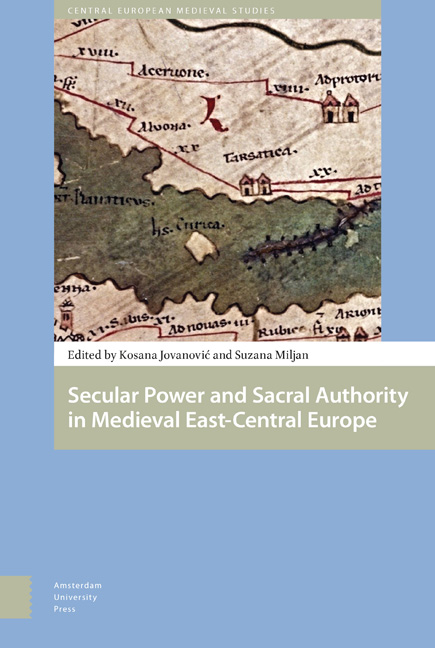Book contents
- Frontmatter
- Contents
- List of Figures and Tables
- Acknowledgements
- Foreword
- Folklore of the Medieval Kings of Hungary: Preliminary Research Report
- Variations on Nobility in Central and South-Eastern Europe: An Introduction
- The Changes of Office of Ban of Slavonia after the Mongol Invasion in Hungary (1242-1267)
- The Reconstruction and Role of Roads in the Formation of a Medieval Cultural Landscape: The Example of Episcopal Estates of Dubrava, Ivanić and Čazma
- From Castle-Warrior to Nobleman: Case Study of a Family of Slavonian Lesser Nobility
- Late Medieval Village in Turopolje (Slavonia): The Example of Donja Lomnica
- Economic Development and Transformation of the Pauline Monasteries near Senj under the Frankapan Patronage
- The Society of the Noble Judges in Northeastern Hungary during the Reign of King Sigismund (1387-1437)
- Development of Ragusan Diplomatic Service in the First Half of the Fifteenth Century: Father and Son at the Court of Duke Sandalj Hranić
- Croatian Students at the University of Prague in the Fifteenth Century
- A Contribution to Medieval Croatian Diplomatics: Cyrillic Charters of Croatian Nobility from the Franciscan Monastery on Trsat in Rijeka
- Peter of Crkvica, a Man Who Could Be Trusted: The Career of a Middle-Ranking Cleric and Diplomat in the Kingdom of Hungary in Mid-Fifteenth Century
- The Nobility of the Despotate of Serbia between Ottoman Empire and Hungary (1457-1459)
- List of Contributors
- Index
Croatian Students at the University of Prague in the Fifteenth Century
Published online by Cambridge University Press: 12 December 2020
- Frontmatter
- Contents
- List of Figures and Tables
- Acknowledgements
- Foreword
- Folklore of the Medieval Kings of Hungary: Preliminary Research Report
- Variations on Nobility in Central and South-Eastern Europe: An Introduction
- The Changes of Office of Ban of Slavonia after the Mongol Invasion in Hungary (1242-1267)
- The Reconstruction and Role of Roads in the Formation of a Medieval Cultural Landscape: The Example of Episcopal Estates of Dubrava, Ivanić and Čazma
- From Castle-Warrior to Nobleman: Case Study of a Family of Slavonian Lesser Nobility
- Late Medieval Village in Turopolje (Slavonia): The Example of Donja Lomnica
- Economic Development and Transformation of the Pauline Monasteries near Senj under the Frankapan Patronage
- The Society of the Noble Judges in Northeastern Hungary during the Reign of King Sigismund (1387-1437)
- Development of Ragusan Diplomatic Service in the First Half of the Fifteenth Century: Father and Son at the Court of Duke Sandalj Hranić
- Croatian Students at the University of Prague in the Fifteenth Century
- A Contribution to Medieval Croatian Diplomatics: Cyrillic Charters of Croatian Nobility from the Franciscan Monastery on Trsat in Rijeka
- Peter of Crkvica, a Man Who Could Be Trusted: The Career of a Middle-Ranking Cleric and Diplomat in the Kingdom of Hungary in Mid-Fifteenth Century
- The Nobility of the Despotate of Serbia between Ottoman Empire and Hungary (1457-1459)
- List of Contributors
- Index
Summary
The following article deals with the issue of spreading the teachings of Jan Hus and the associated revolutionary ideas and experience toward the South Slavic environment. The Hussites formed a medieval movement arising from a reformist group within the Catholic Church, inspired by the life and work of Jan Hus, a Czech Roman Catholic priest and university teacher, who based his teachings on the ideas of John Wycliffe. The movement sought the restoration of a unified Church (reaction to schism) and criticized indulgences as well as the sinful life of priests. After the burning of Jan Hus in 1415, the situation in the Czech lands radicalized and was heading toward long wars, which took place between 1419 and 1434.
The development of the university environment led not only to the establishment of new ideas in the Czech environment, but could also substantially influenced students coming from abroad and lead to the import of heretical ideas to other countries, too. This is particularly interesting is the case of Croats, with whom cultural ties were cemented in the course of the fourteenth century. In 1347, at the beginning of his rule, King Charles IV invited Benedictine monks from Croatia, called Glagolites, to revive the Slavonic liturgy, referring to the Saints Cyril and Methodius tradition, and in order to set up a centre of Slavic religious education. The question was: to what extent did the cultural convergence continue at the level of university education and if it had any effect on the proliferation of Hus's reformist ideas, especially when the Glagolites themselves allegedly translated one or two of Hus's sermons into Croatian.
In the Czech environment, the establishment of the University of Prague in 1348 resulted in the slow constitution of an educated class, which gradually gained more and more rights. In 1392, university doctors, masters, students and their servants were even excluded from the jurisdiction of royal courts and were only subjected to the university court. This educated class gradually garnered more confidence and increasingly wanted to participate in the transformation of the society. This was most obvious at the beginning of the fifteenth century, when university life revolved around the spreading of John Wycliffe's ideas by Jan Hus, who became the most prominent figure of the early fifteenth century.
- Type
- Chapter
- Information
- Publisher: Amsterdam University PressPrint publication year: 2018

